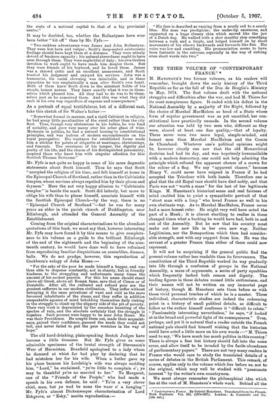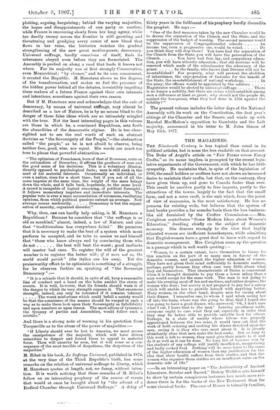THE THIRD VOLUME OF "CONTEMPORARY FRANCE." *
M. HANOTAUX'S two former volumes, as his readers will remember, brought down the early history of the- Third Republic as far as the fall of the Duo de Broglie's Ministry in May, 1874. The first volume dealt with the national struggles and difficulties after the war, and had M. Thiers for its most conspicuous figure. It ended with his defeat in the National Assembly by a majority of the Right, followed by the choice of Marshal MacMahon as head of a State whose form of regular government was as yet unsettled, her con- stitutional laws practically unmade. In the second volume our attention was held by two men who, different as they were, shared at least one fine quality,—that of loyalty. There never were two more loyal, simple-minded, and honest men than Marshal MacMabon and the Comte de Chambord. Whatever one's political opinions might be, however clearly one saw that the old Monarchical doctrine had had its day, and was hopelessly irreconcilable with a modern democracy, one could not help admiring the principle which refused the apparent chance of a crown for the colour of a flag. We say "apparent chance," because Henry V. could never have reigned in France if he had accepted the Tricolour with both hands. Therefore one is glad that the old Royal race should have died nobly, and that Paris was not " worth a mass " for the last of her legitimate Kings. M. Hanotaux's historical sense and real fairness of mind enabled him to paint a sympathetic portrait of that " stout man with a limp " who loved France so well in his own obstinate way. As to Marshal MacMahon, France never had a more honest ruler. He might very well have acted the part of a Monk ; it is almost startling to realise in these changed times what a backing he would have had, both in and out of the Assembly. But he saw that his country must make out her new life in her own new way. Neither Legitimism, nor the Bonapartism which then had consider- able strength, met with any support from him. He was the servant of a greater France than either of these could now represent.
It will not be surprising if the general public find the present volume rather less readable than its forerunners. The constitution of the Third Republic worked its way gradually into life through a confusion of groups in the National Assembly, a maze of arguments, a series of party squabbles which frequently lacked both reason and dignity. The leading figures in these debates roused little enthusiasm, and their names will not be written on any immortal page of history, though M. Hanotaux sets them before us with those vivid personal touches of which he is a master. These individual, characteristic studies are indeed the redeeming point in a history of small political details, as difficult to follow as the author himself confesses it " difficult to relate." " Passionately interesting nevertheless," he says, " if looked at in the broad and powerful light of its consequences." True, perhaps, and yet it is natural that a reader outside the French national pale should find himself wishing that the historian could have acted a little more on his own words :—" M. Thiers used to say, ' We have much too much politics in this country.' There is always a fear lest history should fall into the same error, and allow itself to be invaded by the facile' abundance of parliamentary papers." There are not very many readers in France who would care to study the translated details of a series of debates in the British Parliament. This remark, of course, applies only to the volume which lies before us, not to the original, which may well be studied with "passionate -interest" by the writer's own countrymen.
We must always remember the philosophical .idea which lies at the root of M. Hanotaux's whole work. Behind all the
• Contemporary France. By Gabriel Hanotanz. Translated from the French. With Portraits. Vol III. •(1874.1877). London : A. Constable and Co. Ps. net.]
plotting, arguing, bargaining ; behind the varying majorities, the hopes and disappointments of one party or another, while France is recovering slowly from her long agony, while her deadly enemy across the frontier is still growling and threatening and grudging every ounce of new blood that flows in her veins, the historian watches the gradual strengthening of the new great motive-power, democracy. Universal suffrage, hardly conscious of itself, finds its utterances obeyed even before they are formulated. The Assembly is pushed on along a road that leads it knows not where. For its majority was at first strongly Conservative, even Monarchical; "by chance," and to its own amazement, it created the Republic. M. Hanotaux shows us the degrees of the transformation, and makes us feel the presence of the hidden power behind all the debates, irresistibly impelling these makers of a future France against their own interests and intentions, sometimes against their own reason.
But if M. Hanotaux sees and acknowledges that the rule of democracy, by means of universal suffrage, may almost he
described as a law of Nature, he is by no means blind to the danger of those false ideas which are so intimately mingled with the true. Not the least interesting pages in this Volume are those in which he, a convinced Republican, sets forth the absurdities of the democratic regime. He is too clear- sighted not to see the real worth of such an abstract doctrine as " the Sovereignty of the People,"—the abstraction called " the people," as he is not afraid to observe, being neither free, good, wise, nor equal. His words are much too true to please that powerful abstraction:—
" The optimism of Frenchmen, born of that of Rousseau, rests on the rationalism of Descartes; it affirms the goodness of man and the good sense of his decisions. This is a voluntary illusion, directly opposed to psychological facts ; man is still sunk in the mud of his material interests. Occasionally an individual, or even a nation, rises for a short time ; but if you ask of all the same impulse at the same time, the weight of the mass brings down the whole, and it falls back, hopelessly, to the same level. A crowd is incapable of logical reasoning, of political foresight ; it follows momentary impulses and immediate interests. The popular vote is ever a mere accumulation of erroneous, vacillating opinions, from which political passions extract an average. Now average means mediocrity. . . . . . Democracy is but the organi- sation of anarchy, organised disorder."
Why, then, one can hardly help asking, is M. Hanotaux a Republican ? Because he considers that " the suffrage is as
old as mankind," almost, indeed, a law of Nature, and also that " traditionalism has everywhere failed." He perceives that it is necessary to make the best of a system which must perforce be accepted, and he tries to assure us and himself that "those who know always end by convincing those who do not the best will beat the worst; good instincts
will master bad ones. To register the will of the greatest number is to register the better will ; if it were not so, the world would perish" (the italics are his own). Yet the praiseworthy effort to be optimistic is something of a struggle, for he observes further on, speaking of " the Sovereign Democracy " .- "It is a miracle that it should, in spite of all, keep a reasonable line of conduct and a hand on the helm amidst the storm of events. It is well, however, that its friends should warn it of the danger to which its very strength exposes it. That enormous strength, indeed, can only be tolerated if it remains tolerant.
The worst misfortune which could befall a society would be that the conscience of the masses should be warped in such a way as to make them look upon their Sovereignty as Infallibility and upon numbers as upon reason. The most odious of tyrannies, the tyranny of parties and Assemblies, would follow such a mistake."
And there is a strong note of warning in his quotation from Tocqueville as to the abuse of the power of majorities :— "If Liberty should ever be lost to America, we must accuse the omnipotence of the majority, which will have driven minorities to despair and forced them to appeal to material force. Then will anarchy be seen, but it will come as a con- sequence of the most terrible of despotisms, the despotism of the majorities."
M. Ribot in his book, Le Suffrage Universel, published in 1874, at the very time of the Third Republic's birth, has sonic remarks on the relation of universal suffrage to liberty, which M. Hanotaux quotes at length, not, we fancy, without inten- tion. It is worth noticing that these remarks of M. Ribot's follow on an interesting prophecy of the course of events that would at once be brought about by " the advent of a Radical Chamber through Universal Suffrage." A delay of thirty years in the fulfilment of his prophecy hardly discredits the prophet. He says :- "One of the first measures taken by the new Chamber would be to decree the separation of the Church and the State, and the suppression of the budget of worship. The second measure would
be the suppression of Congregationalist schools An income tax, even a progressive one, would be voted Do you think they will stop there? You have had the separation of the Church from the State, you will have the persecution of the
Church You have had free, lay, and compulsory educa- tion, you will have atheistic education ; that old doctrine will be renewed which made of the schoolmaster the adversary of the priest. . . . . . In the family, who knows that Divorce will not be re-established? For property, what will prevent the abolition of inheritance, the expropriation of factories for the benefit of
the State, the re-establishment of national workshops In the army, the officers would be appointed by the soldiers
Magistrates would be elected by universal suffrage. . . . . . There is no longer a nobility, but there are riches which establish among men a difference at least as great ; why should not the people do, against the bourgeoisie, what they had done in. 1793 against the nobility ?"
The present volume includes the latter days of the National Assembly with its work on the Constitution, the first year's sittings of the Chamber and the Senate, and winds up with Marshal MacMahon's opposition to Gambetta and the Left majority, announced in his letter to M. Jules Simon of May 15th, 1877.































































 Previous page
Previous page